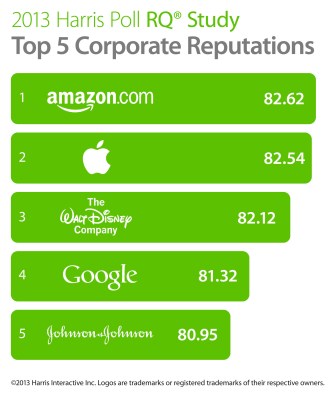A little victory both for Amazon and the world of virtual commerce, today: the online retailer has topped the ranking for best reputation in a poll of 14,000 U.S. consumers, according to Harris Interactive. Apple, which was last year’s winner, slipped down to number-two. At number four, Google was the other tech company to make the top-five in the Harris Poll, now in its 14th year, with Disney (#2) and Johnson&Johnson (#5) rounding out the close list. The full report is embedded below.
Technology also stood out in the rankings in another way: it topped Harris’ list of industries for overall reputation dominance, with a 79% positive reputation. Another marker of how tech continues to become increasingly mainstream.
Consumers are asked to give their assessment on how well companies do in the areas of products and services; financial performance; workplace environment; social responsibility; vision and leadership; and emotional appeal. In these rankings, Amazon topped the list for emotional appeal, where it ranked some five points ahead of any other company, “despite an entirely virtual relationship with the public.”
And crucially, at a time when Amazon is getting more involved in its own-brand hardware and business and consumer cloud services, it also beat out others in the category of products and services. There were some hints of how this might play out back in September, when Apple only just narrowly beat out Amazon for highest reputation ranking for its iPad tablet line versus Amazon’s Kindle Fire tablets, based on a similar poll from JD Power.
Apple has invested a lot into its physical retail presence to complement its online sales — although, according to the Q1 results that came out in January 2013, it’s only seen marginal improvements in the average revenue per week in its stores, $1.25 million per store per week, versus $1.22 million a year ago.
Meanwhile, Amazon’s online-only approach is proving to also be a hit with consumers when it comes to trust: it got “nearly 100%” positive ratings on all questions related to trust. “More than 50 percent of respondents also recall discussing Amazon with friends and family in the past year, and nearly 100 percent of these conversations were positive,” Harris writes.
Apple still topped the rankings in vision and leadership, as well as financial performance — not surprising given the giddy heights of its stock price and profits — although its lead in these areas was not strong enough to average out as the overall leader.
Coming in second on products and services, specifically, is a sign of how the competitive onslaught of Android device makers continues to impact Apple, even if its bottom line remains strong.
Slightly strange is the fact that Harris has a category for “workplace environment” — which affects consumers directly less, and seems to be the kind of thing that would be hard for outsiders to quantify. Nevertheless, good for Google that it’s there: it topped that category.
Reputation measurement from Harris is a kind of old-school ranking that preceded the likes of Klout, Kred and PeerIndex to attempt to measure how one entity is perceived by everyone else.
While you may argue the startups that focus on analytics to measure reputation in social media are possibly more hot air than hot tips, the bigger reputation picture for companies is an important one, in that it often can be directly linked back to how well they do in the retail market, and what they need to improve to do better. (Two non-tech cases in point: the insurance company AIG and the investment bank Goldman Sachs scored the lowest in the poll — a sign that all the scandal surrounding both companies in the sub-prime crisis continues to persist.)
